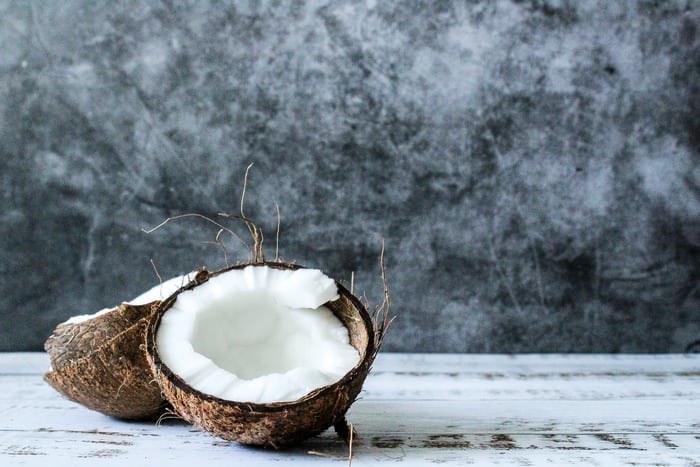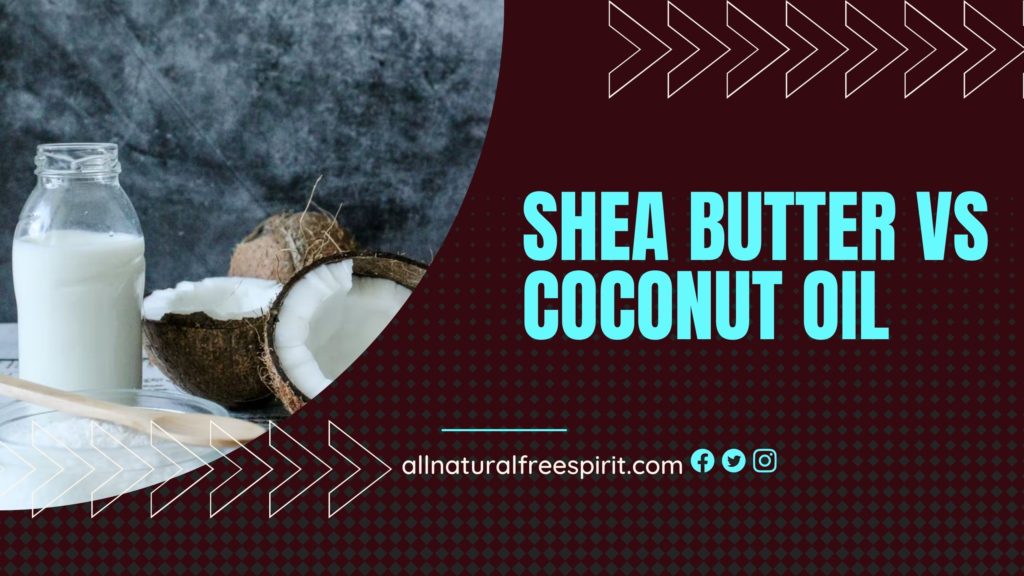Ever wonder which one is better, Shea Butter or Coconut Oil? Shea butter and coconut oil are both great for skincare, but which one is better?
Coconut oil has many benefits that Shea butter may not have. On the other hand, Shea butter has a variety of vitamins that coconut oil does not contain.
This blog post will compare the two products to help you decide what to use for your beauty routine!
The debate over Shea Butter vs Coconut Oil is a never-ending one. People have been asking themselves for years which of the two types of butter they should use on their skin and in their cooking.
The answer to this question varies from person to person, as everyone has different preferences and needs—Luckily, this blog post will help you decide which one is right for you!
Shea Butter vs Coconut Oil: What You Need to Know!

While both Shea Butter and Coconut Oil have a ton of benefits for your skin, there are a few differences between the two that you should be aware of before making your decision: Let’s take a look at some of these differences:
Notable Difference between Shea Butter and Coconut Oil:
- Origin – For starters, shea butter is extracted from the Shea nut, while Coconut Oil is derived from coconut flesh.
- Texture -Shea Butter has a thick, creamy texture, while Coconut oil is more of a liquid or semi-solid state at room temperature.
- Smell – Shea Butter has a distinct Shea nut smell, while Coconut Oil’s scent can vary depending on the brand.

Coconut Oil and Shea Butter for Hair:
Shea butter is an excellent moisturizer for your scalp and hair. Shea butter helps strengthen the roots of your hair, leaving it soft and shiny without making it greasy or heavy.
Shea butter can also help prevent breakage in your hair by strengthening each strand from root to tip!
Coconut oil works wonders on dry, damaged hair because its antibacterial properties fight off any fungus that could be causing damage while simultaneously providing hydration via Vitamin E!
In fact, studies have shown that coconut oil has been used as a remedy for severe cases of dandruff—a common problem among those with damaged or dry hair.
The Verdict: Shea butter is a great moisturizer and has been known to help with dry scalp issues, while coconut oil can be used as a deep conditioner and helps strengthen hair follicles.
So, Which One Should You Use On Your Hair?
Well, it really depends on your specific needs. If you’re looking for an all-in-one product that will help moisturize and nourish your hair, Shea Butter is the way to go.
However, if you’re looking for something to help with deep conditioning or strengthening your hair follicles, then Coconut Oil is the better option.

Shea Butter vs. Coconut Oil for Eczema:
Shea butter has been used for centuries to help with skin conditions, especially itchy and dry ones.
Shea Butter helps moisturize the skin while simultaneously relieving any itchiness or irritation. Shea butter is also full of Vitamin E, which can effectively fight off bacteria that could cause further skin damage!
Coconut Oil works similarly to Shea Butter because its antibacterial properties fight off any fungus growth on your skin—meaning no more irritated, uncomfortable patches of eczema!
Coconut oil doesn’t contain as much Vitamin A as Shea Butter does, but it still provides many benefits when added to your daily skincare routine.
The Verdict: Both Shea Butter and Coconut Oil have their own sets of pros and cons regarding eczema. Shea Butter is better at moisturizing and soothing dry skin, while Coconut Oil is better at fighting fungus and bacteria.
So, Which One Should You Use For Your Eczema?
Well, it really depends on what’s causing your eczema symptoms in the first place! If you need immediate relief from itchiness and dryness, Shea Butter is the obvious choice;
but if you’re experiencing fungal overgrowth, Coconut Oil can help clear that up quickly!

Coconut Oil vs Shea Butter for Skin:
Shea Butter is a fantastic moisturizer that can be used to help with many skin issues, while coconut oil can be used as an effective skincare product.
Shea butter helps by penetrating the skin and providing deep moisture that lasts all day long, while coconut oil simply provides instant hydration to your skin.
Shea Butter does have one major PRO- its high Vitamin A content makes it an excellent ingredient for fighting acne breakouts!
Shea Butter’s anti-inflammatory properties make it great at relieving any redness or irritation caused by acne scars as well.
On the other hand, coconut doesn’t have any Vitamin A, but it is great for repairing damaged skin and fading scars.
The Verdict: Shea butter works better at hydrating/moisturizing dry areas like elbows and feet, while coconut oil helps with itchy, inflamed skin. Shea Butter is a better choice if you’re looking for long-term hydration, while coconut oil can help with short-term relief from eczema symptoms.
So, Which One Should You Use On Your Skin?
If you’re looking for something that will moisturize and nourish your skin over time, Shea Butter is a great choice.
Still, if you need some immediate relief from irritated or itchy patches of eczema on any part of your body, then Coconut Oil is definitely what you should turn to!

Frequently Asked Questions Coconut Oil vs Shea Butter
Can I Use Shea Butter And Coconut Oil On My Face?
Yes! Both Shea Butter and Coconut Oil have properties that effectively fight acne breakouts. If you’re looking for something to help hydrate your skin, Shea Butter is best for this; but if you need something to soothe any pimple-related irritation, then coconut oil is the better option.
Which Is Healthier Coconut Oil Or Butter?
This question is pretty tricky to answer because, even though both Shea Butter and Coconut Oil are used for skincare purposes, they’re also both great for cooking! So make sure you know which one your current health priorities are- if you plan to use it primarily for cooking, coconut oil will be the better choice, but if you plan on using it for skincare purposes, then Shea Butter is the better option.
Can I Mix Shea Butter And Coconut Oil?
This is not recommended because the Shea Butter will act as a binding agent for the coconut oil, which could cause breakouts. However, you can use them separately- just be aware that using both products at once may cause extra acne breakouts.
Shea Butter vs Coconut Oil – both are great for your skin but have different benefits!
It ultimately comes down to what you prefer and your specific needs. If you’re unsure which one to choose, try out samples of each and see which one works better for you.

